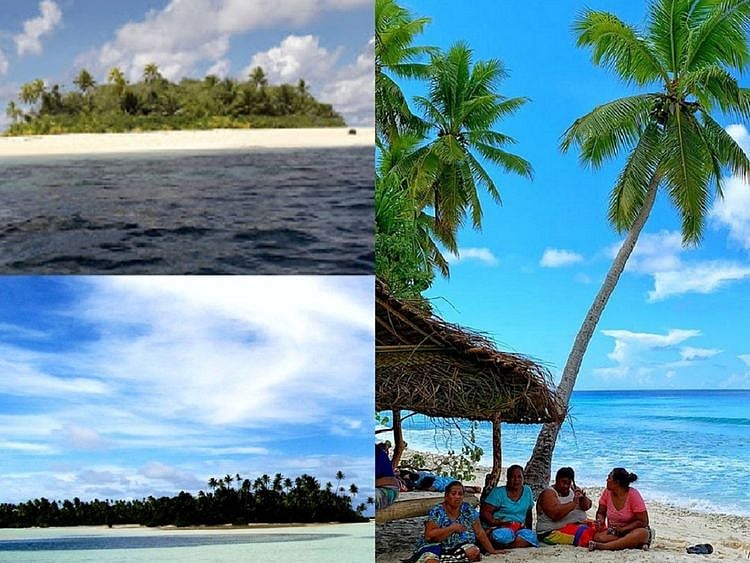No COVID-19 here: Countries with zero cases, or the least affected
Countries that have escaped the pandemic, or those with the least number of cases

Dubai: These are the last places on Earth left untouched or are the least affected by the novel coronavirus.
These are only a few countries and territories -- most of them are remote Pacific islands, plus North Korea.
The list of countries with no COVID-19 cases is based on trackers of Johns Hopkins University or Worldometers.com as of June 14, 2020.
So far, North Korea, a country of 25.5 million people, tops the list. It's not to say everything is fine with the hermit state, as no one knows for sure what’s happening on the ground. An article in The Diplomat cited the country’s COVID-19 containment measures showing negative impacts on its economy, while the World Food Programme has appealed for food aid as the North faces a "food and nutrition security challenges".
South Korean sources had been quoted as saying COVID-19 has indeed spread in the North via the Chinese border.
But Pyongyang’s state control over the media makes it impossible to confirm whether the South's claims are true. It’s also reasonable, however, to think it possible that North Korea's isolation from the rest of the world is helping it largely avoid the pandemic.
The remote Pacific island nations had been largely spared by their geographical location. The pandemic has not reached most of the islands, insulated by their distance.
For example, Kiribati is still nearly 4,500km away from New Zealand — about the distance between Dubai and Rome — though the Kiwis themselves are already among the world's remotest countries hit by the virus.
Last month, Lesotho was the last African country-free of COVID-19, but not anymore, following the confirmation of its first four cases.
Following are the country that recorded COVID-19 cases but were able to deal with them well:
Vietnam
The Asian country is considered a model among neighbours in the fight against SARS-COV-2. A nation of around 95 million population, Vietnam confirmed one of the earliest first COVID-19 cases in the south-east Asian region on January 23.
However, it has so far reported 334 cases -- with zero deaths and 327 recoveries. The country has 1,450 kilometers (900 miles) of land border with China, the ground zero of the virus, which has suffered 4,638 deaths and over 84,000 infections.
Taiwan
Taiwan has successfully managed the COVID-19 crisis bolstering its public health credentials. So far, Taiwan has recorded 443 cases and 7 deaths.
It's one of the few countries to open, with economic activity picking and restrictions being eased.
Taiwan has seen almost no domestic COVID-19 infections since late April. According to theaGoogle report, the number of people at workplaces is 2.7% higher than before the coronavirus outbreak. The Taiwan stock market has shown signs of recovery.
Montenegro
On May 24, Montenegro declared itself Covid-19 free, as emerging Europe reaps rewards of strict lockdown policy.
Montenegro became the second country in Europe to officially report they it is free of active COVID-19 cases.
Montenegro has now joined the Faroe Islands as the only two European countries to have zero active cases of the coronavirus. The government made the announcement on its official Twitter account. From June 1, foreigners from numerous countries were allowered to enter Montenegro.
New Zealand
New Zealand, with nearly 5 million inhabitants, has recorded 22 out of 1154 confirmed COVID-19 cases. On June 12, New Zealand has finally allowed the opening up of the maritime industry by lifting all coronavirus restrictions. No cruise ships and leisure trips are still allowed to enter the country.
No more active coronavirus cases in New Zealand were recorded sine June 2. All socio-economical restrictions are lifted, through borders remain closed. There is still no date set for a much-anticipated open up of travel with neighbouring Australia. No one in New Zealand is receiving hospital-level care for COVID-19.
Iceland
Iceland, with a population of 364,134 has recorded 10 deaths out of 1,808 coronavirus cases. It's been dubbed as an ideal getaway from COVID-19. Recently, the country has been cited for its coronavirus response, having kept its outbreak under control without imposing tough lockdowns.
And it may very well show the way for countries trying to strike a balance between wooing visitors and avoiding a flare-up in cases. The tiny island nation has long been known for its stunning landscapes, views of the Northern Lights, lava caves and other vistas featured in shows like Game of Thrones.
Gulf and Arab countries
The Gulf countries have done fairly well, with rather low case fatality rate (CFR), though confirmed cases have been relatively higher, due to extensive tests done by different GCC countries.
Bahrain, one of the countries that recorded the earliest cases, has recorded 41 deaths out of 18,227 cases. Qatar, Oman, the UAE, Kuwait and Saudi Arabia, have registered CFRs of less than 1%.
In the Arab world, Tunisia is one of the countries that have made early gains against the virus. Following a three-month lockdown, the country has recorded zero local cases for almost a month now. It will be the first nation in the North Africa to reopen its borders, on June 27.
Tunisia has recorded 1,094 cases, with 49 deaths and 995 recoveries as of June 14, 2020. While many other countries continue to struggle against the virus, Tunisians have credited their success in keeping cases of the virus low to their spicy harissa and olive oil.
Sign up for the Daily Briefing
Get the latest news and updates straight to your inbox
Network Links
GN StoreDownload our app
© Al Nisr Publishing LLC 2026. All rights reserved.